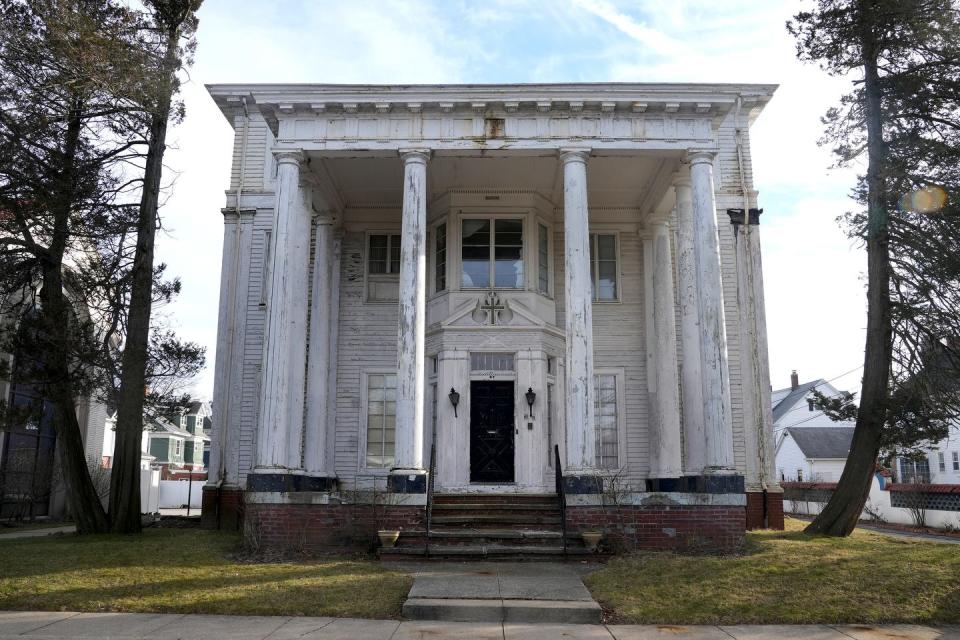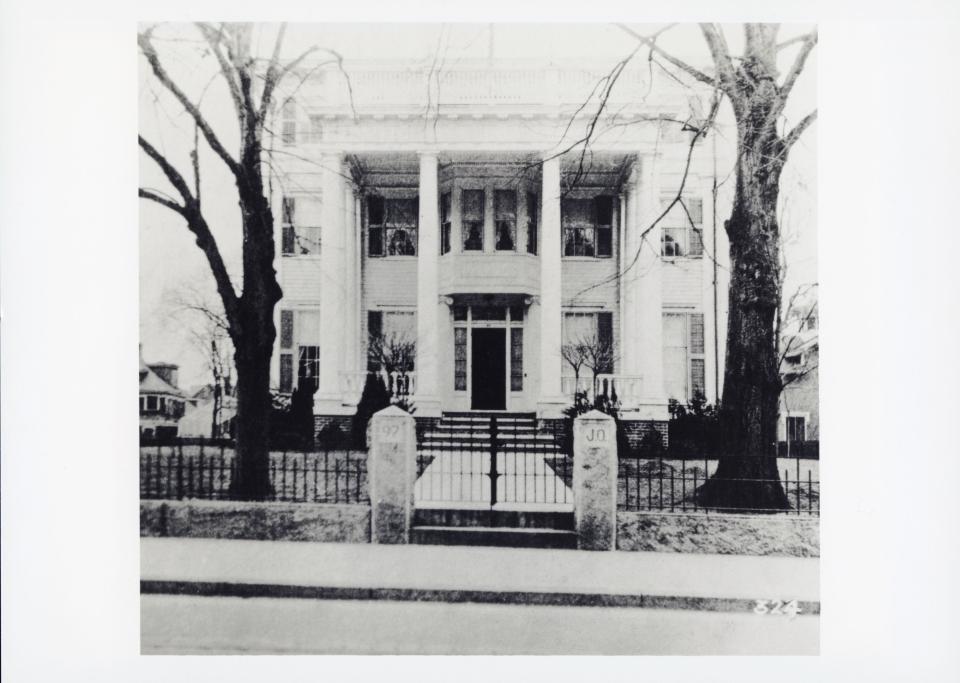A Greek Orthodox church wants to demolish the Read-Ott house. Pawtucket is trying to save it.
PAWTUCKET – City officials were willing to give the Assumption of the Virgin Mary Greek Orthodox Church half a million dollars to restore one of the Quality Hill neighborhood's most prominent architectural gems.
Instead, the church rejected the money and plans to tear down the historical mansion.
The Assumption Greek Orthodox Church has owned the stately Read-Ott house since the 1960s and allowed it to grow increasingly derelict over the years. Neighbors say they've been told that the church wants to replace it with a parking lot, though Peter Microulis, a representative of the church, says that's never been the intent. He told the Pawtucket Historic District Commission last spring that the vacant land would become green space.
Selling the building so that it can be converted into apartments is also out of the question because it would "seriously disrupt the church's core operations," Microulis wrote in a recent letter.
"This house is part of our shared history in Pawtucket," David Sisson, an architect who lives in the neighborhood and serves on Pawtucket's Historic District Commission, told the City Council during a meeting last week. Another neighbor, Mary Healey, echoed him, saying that its absence would be like "a missing tooth."

Church acquired mansion after being forced to move for highway
The Read-Ott house resembles a Greek temple, with a classical two-story portico held up by white columns.
Located at 97 Walcott St., it was built in 1842 for hardware merchant John B. Read and remodeled in the early 20th century for Joseph Ott, the founder of the Royal Weaving Company.
Today, it's a landmark that's hard to miss when entering the Quality Hill neighborhood from downtown Pawtucket, an irreplaceable reminder of the city's prosperous past.
The Greek Orthodox congregation acquired the Read-Ott house after being forced to move to make way for the construction of Interstate 95 in the 1960s, and held services there while they built a new church next door.
Why the building fell into disrepair
The historic mansion served as a home for priests until 1994, but they became "less and less comfortable in the house due to its aging features," Microulis said in an email to The Providence Journal. It was used as office space for about 10 years after that, he added, but "the cost of maintaining even that limited function became too costly to continue."
Neighbors have been complaining about the decrepit state of the building for years, as the Valley Breeze has extensively documented. Some suggest that the church is guilty of "demolition by neglect" – in other words, shirking needed maintenance for so long that tearing the building down starts to look like the only feasible option.

"The term ‘demolition by neglect’ is a catchy phrase that has gained some popularity, but if it is meant to suggest that the church willfully chose to allow the structure to deteriorate in order to achieve this end, then its use is simply disingenuous," Microulis wrote.
"The cost of maintenance and repair has always been the issue that our parish could not manage," he added. "The age and size of the building required more attention than our budgets could support, and yes, it was an unfortunate reality that over the years our attention to its needs could not match the upkeep desired."
Developer's offer rejected
To preservationists and homeowners in the Quality Hill Historic District, bulldozing the Read-Ott house would be a step in the wrong direction.
After an era of "rampant demolition and the resultant gutting of our communities," Pawtucket has been "gradually appealing to artists and entrepreneurs to creatively savor and save its history, repurposing its raw gems with new architectural vision, to stimulate economic growth and to transform its legacy," Counselo Sherba wrote in a letter to the Historic District Commission.
More: Angell Street homes leveled, and neighbors remain 'in the dark' on plans
Camerin Bennett, the city's assistant planning director, similarly noted the "remarkable renaissance of historic homes in the neighborhood" in her appeal to the church's parish council. Quality Hill is now drawing people from the East Side of Providence and as far away as California, she wrote.
Neighbors have been desperately searching for ways to save the Read-Ott house. Sisson told the council that he approached a client who has extensive experience rehabilitating old buildings, and that person offered to buy the dilapidated mansion for $200,000. The church rejected the offer, he said.
Microulis, in an email, said that the church was open to a proposal to move the building. But that didn't pan out, he indicated.
City attempts to intervene
When the church applied for a demolition permit last spring, the Historic District Commission imposed a six-month delay in hopes of buying time.
But those six months were over in October, and there's not much else that the commission can do – it lacks the power to tell people what they can and can't do on their private property.
The City of Pawtucket and the Pawtucket Redevelopment Agency have been advocating to save the Read-Ott house, and discussions with the church have been taking place for months now, said Grace Voll, a spokeswoman for Mayor Don Grebien.
As part of that process, the Providence Revolving Fund assessed the building and estimated that it would cost $1.3 million to rehabilitate. The city offered up to $500,000 in COVID relief funds to help pay for that work, Voll confirmed.
In a January letter to the church, Bennett noted that the grant would make the cost of restoring the building comparable to the cost of demolishing it.
Officials also proposed another alternative: If the church was willing to sell to a developer, the city could help with subdividing the lot and getting zoning approvals. Both suggestions were rejected.
Church passes up financial help
Ultimately, the church decided that demolishing the building "remains the only option we find to be supportive of the long term viability of the church, and clearly in its best interest," Microulis, who serves on the "property beautification committee," wrote in a Jan. 24 letter to Bennett.
The grant funding that the city offered "did not change the fact that the amount and total cost of work needed to rehabilitate the building and make it truly functional again would leave the church with a financial burden that it cannot afford," he said.
Microulis said that city officials had also offered to help with subdividing the lot and getting zoning approvals if the church was willing to sell to a developer who would convert the historic mansion into apartments.
However, he said, it wouldn't be possible to have "an on-going residential element" so close to church property without "significantly limiting and impeding the church’s ability to achieve its primary spiritual goals and functions."
"The church and its parishioners certainly recognize the delicate nature of this matter," Microulis wrote. "It has been such internally within our parish for a very long time, and we have reached this conclusion not without great distress and regret. Yet, we do not have a reasonable alternative option."
What happens now?
The church hasn't been issued a demolition permit yet, Voll said. It still needs to submit the required documentation, such as proof that water and other utilities have been turned off.
"We have also requested that we get a sign-off from the bishop before we issue the permit," Voll said, adding that the city intends to keep advocating against demolition.
Speaking before the council last week, Sisson urged officials to explore every possible option to preserve the Read-Ott house, including "perhaps even taking the property by eminent domain."
Microulis said that no firm date has been set, but that some initial work, like turning off utilities, has already happened.
"We anticipate that the remainder of the project would commence within the next few months," he said.
This article originally appeared on The Providence Journal: Read-Ott house in Pawtucket may be demolished by owners

